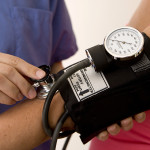By David Blyweiss, M.D.
High blood pressure is the most common of all cardiovascular diseases and the leading cause of heart attack and stroke—the first- and third-leading causes of death among Americans. It’s so out of control that, according to the National Heart, Lung and Blood Association, nearly one-third of Americans suffer from hypertension (high blood pressure).
If your blood pressure is too high, your heart has to work harder, eventually developing atherosclerosis, or hardening of the arteries. High blood pressure can also result in other conditions, such as kidney disease, diabetes, blindness, and congestive heart failure.
Because hypertension is largely a “silent” or symptomless disease, it’s important to get your blood pressure checked at least once a year, starting at age 40. Symptoms—which include dizziness, headaches, nosebleeds, fatigue, ringing in the ears, insomnia, and sweating—can occur if blood pressure is already very high.
To control high blood pressure, most doctors recommend lifestyle changes—exercise, relaxation, and cutting back on salt—plus medication. But now, a daily cup of hibiscus tea could join that line up. It appears to ease mild hypertension the same way many anti-hypertensive drugs do—by opening the blood vessels, decreasing the viscosity of the blood, and increasing urine production (which reduces blood volume).
In one recent clinical trial, 65 patients with mild high blood pressure or pre-hypertension drank either three cups of hibiscus tea or a placebo drink daily for six weeks. Overall, drinking the hibiscus tea lowered systolic blood pressure—the top number in the blood pressure reading—by an average of seven points. That was significantly more than the drop observed in people who were given the hibiscus-flavored water.
Another study compared the blood pressure lowering effects of hibiscus tea to those of black tea. Sixty diabetic patients with mild hypertension drank either hibiscus or black tea twice a day. After just a month, those sipping the hibiscus tea saw their blood pressure drop an impressive 21 points while the participants drinking the black tea actually saw their pressure rise nine points.
In hypertensive individuals, systolic pressure (the top number) tops 140 and diastolic pressure (the bottom number) 90. Normal blood pressure measures below 120/80, which means hibiscus tea could bring a mild case of hypertension down to near normal in less than a month. This is especially true if you combine hibiscus tea with other natural herbs and nutrients like magnesium, hawthorn and garlic.
The World's Quickest Solution for Ending Prostate and Urinary Misery
This has recently been revealed to be one of the only real breakthroughs in prostate health.
The seeds of a strange fruit (sometimes called "Chinese Apples") hold powerful phytonutrients that are a revolution in prostate health.
In fact, UCLA and Veterans Administration research have now proved this to be true.
Not only that, but it may be the worlds quickest solution for ending prostate misery.
Simply stated, these phytonutrients represent a huge step beyond beta sitosterol, saw palmetto, and other phytosterols alone.
Simply click HERE if you want to have fast prostate relief...restful, uninterrupted sleep...no more constant "urges to go"...enhanced virility...and optimal prostate support for life.
Earlier studies show that the tea also controls mild to moderate hypertension as effectively as captopril, a leading drug for hypertension and heart failure. What is it about hibiscus tea that makes it so effective at lowering blood pressure? A growing number of doctors—myself included—are focusing on the tea’s high flavonoid content.
How should hypertensives use this wonder beverage? If you currently take blood-pressure medication, I recommend working with an herb-savvy medical professional using conventional diagnostic techniques to make sure your blood pressure stays within acceptable levels as you slowly cut back on your pharmaceutical hypertension drugs. If you are pre-hypertensive, try swapping out your regular cuppa with three cups of ruby red hibiscus tea every day. But be patient. Typically, herbs don’t work as quickly as synthetic drugs and it could take a month or more to see any improvement.
References:
Herrera-Arellano A. Effectiveness and tolerability of a standardized extract from Hibiscus sabdariffa in patients with mild to moderate hypertension: a controlled and randomized clinical trial. Phytomedicine. 2004;11:375-382.
McKay DL. Hibiscus sabdariffa L. tea (tisane) lowers blood pressure in prehypertensive and mildly hypertensive adults. Journal of Nutrition. 2010;140:298-303.
Mozaffari-Khosravi H. The effects of sour tea (Hibiscus sabdariffa) on hypertension in patients with type II diabetes. Journal of Human Hypertension. 2009;23:48-54






